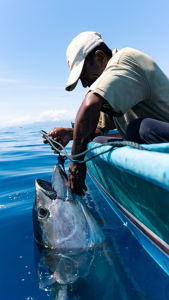 Indonesian handline tuna fisheries are more than just a source of fish; they are lifelines for local communities, fostering equitable wealth distribution, enhancing food security, and empowering women through gender-equal employment opportunities. However, many of these remote coastal fishing communities face significant challenges. They urgently need reliable access to electricity, improved skills in fish handling and food safety practices, modernisation of their fishing boats and upgrading of shore-based facilities to maintain a continuous cold chain for their catch. Maintaining this cold chain is critical to ensure that fish and other seafood products arrive fresh and of the highest quality at their destination.
Indonesian handline tuna fisheries are more than just a source of fish; they are lifelines for local communities, fostering equitable wealth distribution, enhancing food security, and empowering women through gender-equal employment opportunities. However, many of these remote coastal fishing communities face significant challenges. They urgently need reliable access to electricity, improved skills in fish handling and food safety practices, modernisation of their fishing boats and upgrading of shore-based facilities to maintain a continuous cold chain for their catch. Maintaining this cold chain is critical to ensure that fish and other seafood products arrive fresh and of the highest quality at their destination.
Furthermore, these small-scale fishers are often out-competed by industrial fisheries for limited resources, sidelined by decision-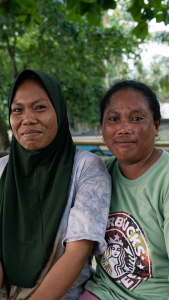 makers, and forced to compete in seafood markets that fail to offer them a level playing field. To add to their struggles, these communities are often on the front lines of climate change impacts, facing unprecedented challenges that threaten their livelihoods. Therefore, innovative solutions that combat climate change and help them compete on an equal footing in global seafood markets are essential for their future.
makers, and forced to compete in seafood markets that fail to offer them a level playing field. To add to their struggles, these communities are often on the front lines of climate change impacts, facing unprecedented challenges that threaten their livelihoods. Therefore, innovative solutions that combat climate change and help them compete on an equal footing in global seafood markets are essential for their future.
The Solar Ice Maker project supports Indonesia’s vision of a Blue Economy in which the ocean is a crucial driver of economic growth and innovation, improving the livelihoods of coastal communities while preserving the country’s unrivalled biodiversity through healthier oceans and coastal ecosystems. It contributes directly, amongst others, to SDG 12 (Responsible Consumption and Production), SDG 13 (Climate Action), and SDG 14b (providing small-scale fishers access to marine resources and markets). The technology used in the ice maker further minimises waste and aligns with global sustainability standards by reducing the carbon footprint of ice production.
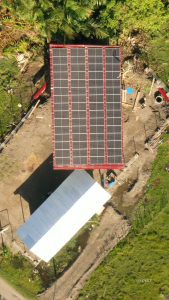
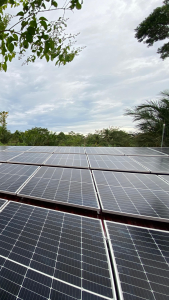
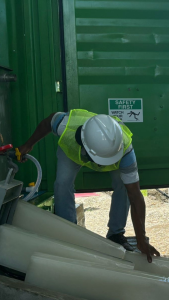
The project goes beyond just environmental gains; it’s a powerful catalyst for social transformation, bringing real income stability to small-scale fishers. With improved cold chain reliability, these fishers can unlock the full value of their catch, minimise their financial losses and boost local economic growth. This initiative is an inspiring model for other coastal regions facing similar hurdles in cold chain logistics and post-harvest losses. 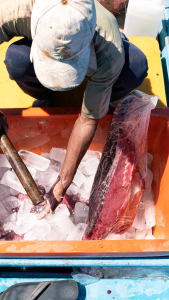
Shannon Hardisty, Social Responsibility Director of IPNLF, explains, “As simple as it may sound, ice is a crucial step in the supply chain to achieve a higher-quality product. With this innovation, fishers can nearly triple their income because of the higher-grade tuna they sell. Their product can be sold to international markets such as Japan and the USA with that grade, which means rural fishers can increase access to global markets and improve their livelihoods.
A Future of Opportunity
The launch of the Solar Ice Maker is potentially a game-changer for the seafood industry, philanthropic donors and climate-related investors alike, and could potentially be incorporated under “blue” bonds where bond issuance is linked to the SDG goals. This 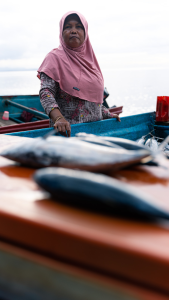 groundbreaking project showcases how responsible innovation can uplift small-scale fisheries, transforming socio-economic conditions in coastal communities while paving the way for a sustainable future in seafood production. With its solar-powered solution, the Solar Ice Maker is already turning heads among major players in the seafood sector. They recognise its potential to revolutionise traditional cold chain logistics, presenting both exciting opportunities for growth and a challenge to outdated practices.
groundbreaking project showcases how responsible innovation can uplift small-scale fisheries, transforming socio-economic conditions in coastal communities while paving the way for a sustainable future in seafood production. With its solar-powered solution, the Solar Ice Maker is already turning heads among major players in the seafood sector. They recognise its potential to revolutionise traditional cold chain logistics, presenting both exciting opportunities for growth and a challenge to outdated practices.
Dr. Mary Matthews, UNDP Ocean Innovation Challenge Manager, echoed these sentiments: “We were looking for transformative, scalable, replicable projects to help with sustainable fisheries. It allowed the fishermen, the fisherfolk, to preserve their catch, so fewer catches had to be caught to get good quality catch to market. And to do it in an environmentally friendly way that’s met all the criteria. The wonderful thing about this is that we can make ice as long as the sun shines.”
Martin Purves, Managing Director of IPNLF, added, “Transitioning to renewable energy in the fisheries sector, especially in small-scale fisheries, can be a major achievement in the battle to address climate change impacts. The Solar Ice Maker not only strengthens local cold chain infrastructure but also represents a crucial investment in the future of sustainable small-scale fisheries. We are keen to work with our market partners, investors and the donor community to find scalable solutions that will help ensure long-term market access and improved economic resilience for small-scale fishers and their dependent coastal communities.”